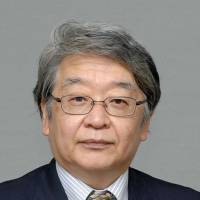The government announced Tuesday that it has appointed a deputy foreign minister as chief negotiator for the Trans-Pacific Partnership free trade pact, with an eye to bringing the deal into force without the United States.
Keiichi Katakami takes up the post while still holding his deputy ministerial role. The post of TPP chief negotiator has been vacant since Hiroshi Oe became head of the Japanese diplomatic mission at the OECD in February.
The appointment of a vice ministerial-level bureaucrat to chief negotiator reflects Japan's eagerness to take the lead in making the free trade pact, once signed by 12 nations, take effect among the remaining 11 countries, a source close to the matter said.
The United States withdrew from the multilateral agreement in January as President Donald Trump prefers bilateral trade deals.
Katakami was the director general of the Foreign Ministry's Economic Affairs Bureau when Japan joined the TPP negotiations in 2013.
He became deputy foreign minister in charge of economic affairs last June after holding such posts as ambassador to the European Union.
The 11-party TPP is likely to be discussed at a meeting of the group's chief negotiators in Canada in early May, and at a gathering of their trade ministers in Vietnam around May 20 on the sidelines of an Asia-Pacific Economic Cooperation forum meeting.
The TPP was signed in February 2016 by Australia, Brunei, Canada, Chile, Japan, Malaysia, Mexico, New Zealand, Peru, Singapore, the United States and Vietnam — covering around 40 percent of global gross domestic product.
Under the current rules, the TPP's implementation requires ratification by nations accounting for 85 percent of the combined GDP of the 12 member countries. The deal was therefore effectively dead in the wake of the withdrawal of the United States because the country represents over 60 percent of the trade bloc's GDP.



